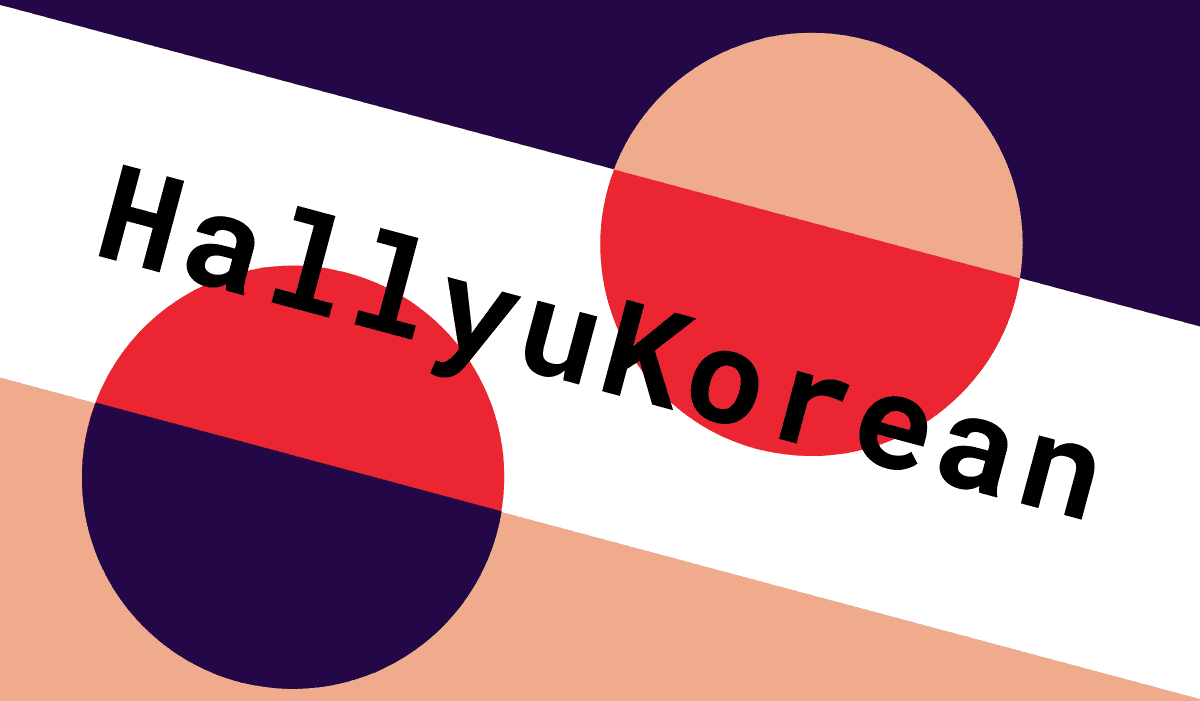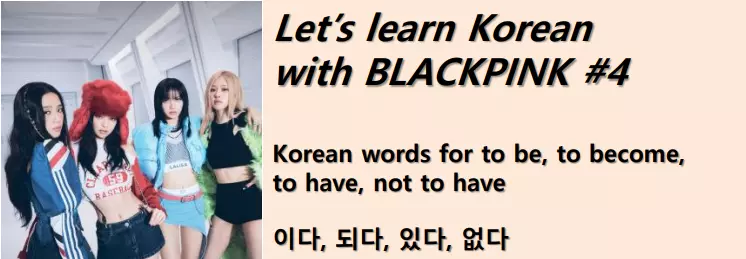Korean words for to be, to become, to have, not to have : 이다, 되다, 있다, 없다
Let’s learn Korean words for to be, to become, to have, not to have with BLACKPINK lyrics.
Click the play button below to listen to all the BLACKPINK lyrics used in this post.
이다, 되다, 있다, 없다 are the most common Korean verbs.
*noun + 이다 : to be
*되다 : to become
*있다 : to exist, to have
*없다 : don’t exist, don’t have
이다 [i-da] to be
새로운 시작이야
sae-ro-un si-ja-gi-ya
It’s a new beginning
*새로운(new) +
시작(beginning) + 이야(be, =이다)
(*When the verb ~이다 is conjugated with ~이야/야, 이야 for noun which end with a consonant, 야 for noun which end with a vowel.
When the verb ~이다 is conjugated with ~이에요/예요, 이에요 for noun which end with a consonant, 예요 for noun which end with a vowel.)
되다 [doe-da] to be, to become
상상해봐 우리가 하나 되는 게 어떨지
sang-sang-hae-bwa u-ri-ga ha-na doe-neun ge eo-tteol-ji
Imagine what it will be like when we become one
*상상해봐(상상(imagine) + 해봐(try ~ing)) +
우리(we) + 가(subject particle) +
하나(one) +
되는(되다(become) + ㄴ(noun modifier)) +
게(것(thing) + 이(subject particle), =게) +
어떨지(what it will be like)
(*~ㄹ지 is a connective ending used when you have a doubt about a certain assumption and relate it to the fact or judgement of the following statement.)
있다 [it-tta] to exist, to have
아프더라도 너만 있으면 돼
a-peu-deo-ra-do neo-man i-sseu-myeon dwae
You’re all I need, even if it hurts
*아프더라도(아프다(hurt) + 더라도(even if)) +
너(you) + 만(only) +
있으면(있다(exist) + 으면(a connective ending used when speaking hypothetically)) +
돼(be)
없다 [eop-tta] to not have
이젠 기다릴 것도 없잖아
i-jen gi-da-ril geot-do eop-ja-na
Now there’s nothing to wait for
*이젠(now) +
기다릴(기다리다(wait) + ㄹ(noun modifier for future tense verb)) +
것(thing) + 도(too) +
없잖아(없다(there isn’t) + ~잖아(as you know)?)
(*~잖아(요) reminds the listener of something or rebukes the listener indirectly.
~잖아(요) is the same as ‘as you know’, ‘didn’t I say that~’ in English.)
Grammar Reference
*~면, ~으면, ~다면, ~(이)라면 : if (hypothetical)
ex)있으면 : 있다(exist) + 으면(a connective ending used when speaking hypothetically)
*Tense
*Present tense : Adjective/verb stem + ~아/어/해요
*Past tense : Adjective/verb stem + ~았/었/했어요
*Future tense : Adjective/verb stem + ~(으)ㄹ 거예요 / ~ㄹ 게요/ ~겠어요
The basic way to get the verb/adjective stem is to remove 다 from the verb/adjective.
If there is a vowel ㅏ or ㅗ on the final syllable of the adjective/verb stem, 아요(present tense), 았어요(past tense), 을 거예요(future tense) is used.
If there is a vowel other than ㅏ or ㅗ on the final syllable of the adjective/verb, 어요(present tense), 었어요(past tense), ㄹ 거예요(future tense) is used.
Also, if there is 하다 in the adjective/verb, 하다 changes to 해요(present tense), 했어요(past tense), 할 거예요(future tense).
Below you can see the conjugation of 이다, 되다, 있다, 없다 by tenses.
| Present tense | Past tense | Future tense | |
| 이다 | 이에요(=예요) | 이었어요 | 일 거예요 |
| 되다 | 되어요(=돼요) | 되었어요(=됐어요) | 될 거예요 |
| 있다 | 있어요 | 있었어요 | 있을 거예요 |
| 없다 | 없어요 | 없었어요 | 없을 거예요 |
*Speech levels
The three most commonly used Korean speech levels are 합쇼체 (formal polite), 해요체 (informal polite) and 해체 (informal plain).
*The formal polite style : Adjective/verb stem + ~(스)ㅂ니다
~(스)ㅂ니다 is used more in formal or public situations including the military, news, reporting presentations, meetings and lectures. It’s mainly used to address large gatherings or people you don’t know personally.
*The informal polite style : Adjective/verb stem + ~아/어/해요
~아/어/해요 is most commonly used in everyday life. Compared to the formal polite style, the informal polite style is softer and less formal, so it is mainly used among family members, friends, shopkeepers and other close acquaintances.
*The informal plain style : Adjective/verb stem + ~아/어/해
As for the informal plain style ~아/어/해, it is mainly used among friends from superiors to people of lower rank and among family members.
Below you can see the conjugation of 이다, 되다, 있다, 없다 by speech levels.
| Formal polite | Informal polite | Informal plain | |
| 이다 | 입니다 | 이에요(=예요) | 이야(=야) |
| 되다 | 됩니다 | 되어요(=돼요) | 돼 |
| 있다 | 있습니다 | 있어요 | 있어 |
| 없다 | 없습니다 | 없어요 | 없어 |

